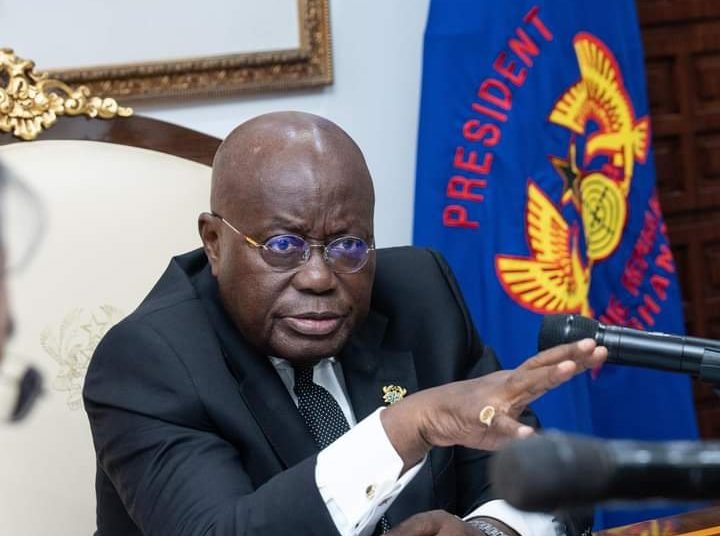The President of the Republic of Ghana, Nana Addo Dankwa Akufo-Addo has called for a debate to arrive at a constitutional decision on the entitlements of Article 71 Officeholders in view of the public’s concerns about the matter.
He set the tone with a suggestion that the country, among others, must examine the practice of other jurisdictions such as the United States of America, where the principles were established and automatically adjusted according to certain objective criteria.
He further averred to the newly constituted Committee of Emoluments for Article 71 Officeholders to consider public concerns about whether or not such officeholders, notwithstanding the constitutional imperative, deserved what was paid to them in view of the current economic challenges.
President Akufo-Addo made the call when he swore in a five-member Committee of Emoluments for Article 71 Officeholders at the Jubilee House in Accra last Wednesday evening.
Composition
The committed is chaired by a lawyer and immediate past Chairperson of the Public Services Commission, Dr Janet Ampadu-Fofie.
The members are the Chairman of the National Development Planning Commission, Professor George Gyan-Baffuor; a lawyer and women’s rights activists, Gloria Ofori-Buadu; a research fellow at the Institute of Statistical, Social and Economic Research (ISSER) of the University of Ghana, Prof. Isaac Osei-Akoto, and the Chief Executive of the Fair Wages and Salaries Commission, Benjamin Arthur.
They swore the Official Oath and Oath of secrecy.
As the terms of reference, the committee is to make recommendations in respect of emoluments and other privileges for Article 71 Officeholders as specified under the Constitution.
The committee is also to examine any other relevant matter which it deems appropriate to its work.
President Akufo-Addo indicated that in recent times, there had been public discourse surrounding the remuneration of public officers which had centred primarily on those of Article 71 Officeholders.
Public
The debate, the President explained, had centred on “whether or not notwithstanding the Constitutional imperative, we are deserving of what is being paid to us in view of the challenges currently confronting our national economy”.
He, therefore, suggested to the committee that it might well be that their work should also focus on those concerns and make recommendations on how they should be addressed.
President Akufo-Addo stated that it appeared that every President of the Republic was bound by the constitutional injunction to establish the Committee of Emoluments for Article 71 Officeholders to consider the emoluments of Article 71 officeholders.
“I think it may be worth our while to examine the practice of other jurisdictions.
For example, the American one, where the principles are established and automatically adjusted according to certain objective criteria,” he added.
Article 71
The inauguration of the five-member committee is sanctioned by Article 71 (1) of the Constitution which requires the President to set it up to determine the salaries and allowances payable, and the facilities and privileges available to his office, the Vice-President, the Speaker and Members of Parliament and a group of nine officeholders spelt out in that Article.
The recommendations of the five-member committee are subject to the approval of the President and Parliament.
The composition of the committee is done on the advice of the Council of State.
“I’ve appointed you to this committee on the advice of the council of responsible Ghanaians as eminently qualified to undertake this important function and I congratulate each and every one of you on your appointment,” President Akufo-Addo said.
He urged the committee to bring to the table the work of previous committees, namely those chaired by Miranda Greenstreet, Mary Chinnery Hesse, Ishmael Yamson, Marian Ewurama Addy, Francisca Dora Edu-Buandoh and Yaa Ntiamoah Badu in the conduct of their work to be able to establish some consistencies.
The President also reminded members of the committee that the task ahead was a challenging one but it was his expectation that they would be up to it and deliver their report expeditiously.
President Akufo-Addo assured the committee of his full support for the assignment as well as his government’s assistance if needed throughout the period of their work.
Dr Ampadu-Fofie, on behalf of the committee, commended the government and the Council of State for the confidence reposed in them.
She gave an assurance that they would work diligently and expeditiously to deliver on their mandate.
Background
The Speaker of Parliament, Alban Sumana Kingsford Bagbin, recently reiterated that the money paid to Members of Parliament (MPs) and other Article 71 Officeholders every four years was accumulated salary arrears (gratuity) and not ex gratia.
He said at the beginning of every Parliament, most legislators, including himself as the Speaker, did not know the exact salary they were entitled to until the end of their four-year term; a practice he described as “wrong”.
The Speaker explained that whenever Ghanaians talked about budget for Parliament, they considered such budget as money earmarked for salaries and conditions of service of MPs, “especially what people refer to as ex gratia.”
“Gratuity is different from ex gratia; what they pay MPs is gratuity and it is another wrong practice because as we sit here in our third year, which is three years down, I as the Speaker do not know my salary,” he revealed.
Unstable salary
Speaking during a visit to the Graphic Communications Group Limited (GCGL), Mr Bagbin said: “My salary has not yet been fixed and so every month I am paid something based on what my predecessor was earning.’’
“But we all know from the labour front that every year they try to renegotiate with the government and so at the end of the four years then they (government) come out with your salary.”
“And that will definitely be higher than the first year and so they have to pay you arrears.
It is those arrears that balloon to what the Members of Parliament take at the end of four years and people call that ex gratia and you get the problem,” the Speaker explained.
Source: Graphic Online






























































